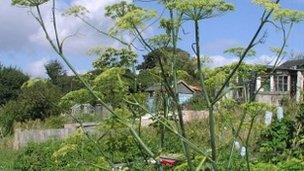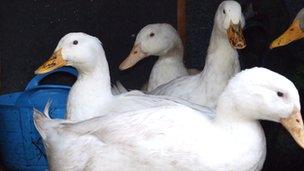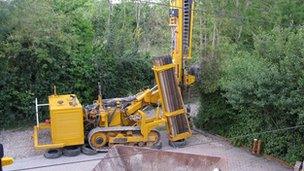Hosepipe ban: Your stories
- Published
Hosepipe bans affecting about 20 million customers have been introduced by <link> <caption>seven water authorities </caption> <url href="http://www.bbc.co.uk/news/uk-17615364" platform="highweb"/> </link> in parts of southern and eastern England.
People who flout the bans, which follow one of the driest two-year periods on record, face fines of up to £1,000.
BBC News website readers have been telling us how they will be affected by the ban.
Paul Reading, Brighton

Paul Reading: "Allotments are now classed as domestic gardens"
The ban also applies to allotments, and not only use of hoses to water but also use of flexible pipes to refill water butts.
The result is that local food production - promoted by a number of initiatives including lower carbon footprint, improved biodiversity, value in reducing incidence of mental health issues - is classed with domestic gardens rather than farming and smallholdings.
There are around 28 allotment sites in the Brighton and Hove area. As a tenant you rent a plot from the council. It's comparatively expensive - around 250sqm costs £70 a year.
Last year the government amended legislation so allotments are now classed as domestic gardens. Having an allotment is viewed as a leisure activity.
In Brighton we have a Green administration, but even under the Tories there have been initiatives to promote people growing their own food, to reduce carbon emissions and food miles.
There are around 180 plots on my site and only nine taps.
Many plot holders are pensioners so have water butts on their allotments which they fill up with a hosepipe so they don't have to stagger around with heavy watering cans.
If there is low rainfall from now to October the result will therefore be an increase in food miles and transport costs, and a reduction in the value of allotments to the health and wellbeing of communities.
The well-paid senior staff at the water autorities are of course uninterested, as in general are the media, focussed on the risk to garden lawns and public fountains which we can do without in order to conserve stocks.
Valerie Costin, Kent

Valerie Costin: "Are my animals supposed to suffer?"
I contacted my water company two weeks ago to see if I could get an exemption on the basis of animal welfare - and still haven't heard back.
I keep eight domestic ducks and they have a bath and a water bowl. I have hosepipes leading to them so I need to know where I stand.
I have CRPS (Complex Regional Pain Syndrome) so I can't carry buckets of water to my animals. I'm on morphine and other drugs on a daily basis.
On the water company's website it says that animal welfare shouldn't be affected because of the ban. So I called them and the lad on the phone said he would speak to the department concerned and I would get a phone call saying whether I was exempt.
I don't want to intentionally break the law but they haven't got back to me yet. Are my animals supposed to suffer whilst they consider?
Meanwhile yesterday, just to add insult to injury, the same water company invaded the road where I live - Castle Road - to dig up all the pipes.
My son is disabled and I need access to my car but it's become impossible to find parking after 15:00. If I need to get my son to hospital it's pretty tough.
We phoned them yesterday to get information about the closures and we couldn't get any - it's just a joke. I know they need to replace the pipes but they need to do it better.
So I'm not just angry about the hosepipe ban, but this too.
Kevin Stirzaker, Hungerford, Berkshire

Kevin Stirzaker: "I am led to believe that we do not come under the hosepipe ban"
Ever since our house was built, at the beginning of this millennium, our water has been sourced from a borehole and as such we are not customers of our local water supplier.
Even though we have a stream going through the bottom of our garden, we still had to go down over 150 feet to reach a good reliable supply of excellent water.
The first hole we dug was only 20 feet so we had to get a company to come in to dig a bigger hole. They left us with a huge bill and a crater the size of a caravan which eventually collapsed.
We contacted our local water supplier about getting connected to the mains but they told us it would take 12 weeks and cost £30,000.
In the end we carried on drilling to 150 feet. We had no water for four weeks apart from a header tank in the loft which we filled with bottled water.
The only downside is that if we get a power cut we also lose our water supply.
I'm not sure if we're prepared for the ban as such, though we do have four large water butts plus one very large butt, all topped up by rainwater, but I am led to believe that we do not come under the hosepipe ban.
I would be curious to know if this was the case.
More of your comments
I'm heavily pregnant and my husband works away so I can't ask him to water the shrubs. I am a little upset that pregnant women who can't carry heavy watering cans up long gardens haven't been taken into account as an exception because instead of sensible watering with a hose, everything is going to have to be left to perish! Emma Norman, Chigwell, Essex
We are a golf club struggling to survive like every company. Water is the main source of our club's future. This ban is going to have a complete adverse effect on our club. Already a lot of members have threatened us with resignation. We'll lose green fees from visitors and guests and societies. We'll have to lay off staff and lose income on the bar and catering. The council will lose 65k in rate which we pay. They said national sport will be exempt, but golf clubs are not in the category. Why? S Chadee, London
While I understand the need to conserve water and have a hosepipe ban in place, it doesn't make sense that I can't use a hosepipe to clean my own private motor vehicle once or twice a month, but if I was a business cleaning private motor vehicles, maybe hundreds per week, using a hosepipe is perfectly OK. how does that work? If there is no water, there's no water -not litres for sports venues, businesses and blue badge holders, but none for the rest of society. S Filmer, Kent
- Published16 April 2012
- Published5 April 2012
- Published5 April 2012
- Published5 April 2012
- Published5 April 2012
- Published3 April 2012
- Published4 April 2012
- Published23 November 2011